#This is my cheatsheet for writing these two from here on out
Explore tagged Tumblr posts
Text
Thinking about Adam Milligan AND Michael
Thinking about when Adams actor Jake Abel said that Adam would be fucking delighted to know Michael immediately betrayed the Winchesters after his death like underrated character trait of Adam Milligan is how much he HATES Sam and Dean. I feel like Adam is a pretty easy character to mess up or misinterpret because if you pull him too far from being just a guy you risk making him into a Crazy Winchester which is the exact opposite of what he is but I genuinely believe he would let them both die with little conflict. And you know what good for him, I'm glad, Low key think Sam and Dean deserve death by him and only him ngl
Like Adam would never ask Michael to kill them but if for some reason Michael was in the bunker and Dean bumped his shoulder in the hallway and Michael decided "You know what It's Time." Adam would just be like "can't argue with that, It's Just Time." and the entire bunker would just be vaporized off the planet
BUT if a customer at the bar Adam worked at broke a chair over Adams head in a fit of rage Adam would just tell Michael "This guy is obviously an asshole but lets just call the cops and get this guy arrested" and Michael would say "He NEEDS to be accosted by an Angel of the LORD We need to call upon HELLFIRE-" And then the guy would just get arrested
ALSO THOUGH if a guy tried to repeatedly get Adams number and flirt with him Adam would say "I'm litterally going to outlive this guy by centuries dont kill him now i wanna show up at his deathbed in 50 years itll be so funny" and Michael would be like "What should i make us for dinner maybe hawawshi how do you feel about hawawshi?" and then that guy would die of a unrelated heart condition 2 hours later.
#This is my cheatsheet for writing these two from here on out#you guys see what im going for?#Adam has a lot of emotions hes just normal about them#And for the last one while i DO see Michael as protective sometimes but hes litterally possessing Adams body lmao#he doesnt need to guess how adam feels#Also peep the Michael cooking headcanon#I see him as making a lot of mediterranean and middle eastern dishes#modified to adams taste of course#catch him out here making cheese katayif as a snack for adam#midam#michael spn#midam spn#adam milligan
264 notes
·
View notes
Text
Math Tips

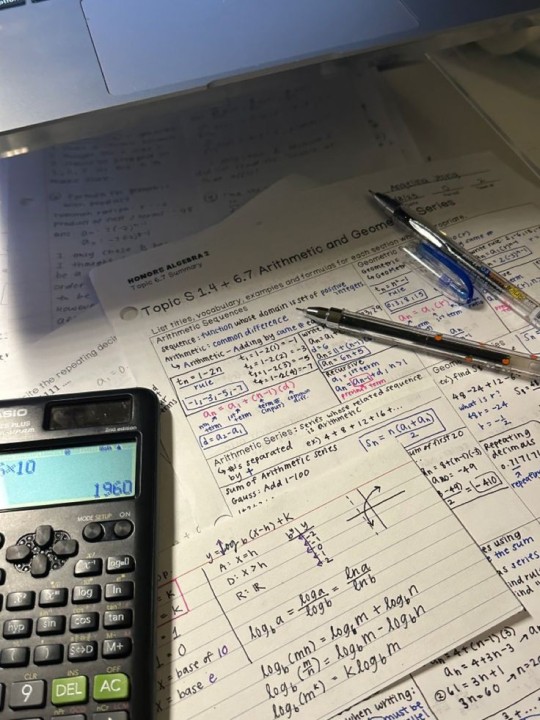
(Pictures are not mine)
Well, let me tell you, we all have this love-hate relationship with this subject, right? The worst part is that when you don't know what the heck is going on, so, as a girl who studied maths (2 Volumes/textbooks) on her own during the year she was homeschooled, here are some tips and tricks that I did to get an A+ in my math finals!
Get your syllabus together
In the beginning I had no damn idea what was going on and it was just confusing. I had to do the first thing I did was taken my index/table of contents and mark the chapters which i knew very well and the ones I had no clue about. And then i arranged them with the marking scheme, like which one carries the most marks etc etc and study accordingly.
Complete lessons/chapters that you already know
When you finish off the things you already know then that's gonna give you the confidence you need even if you know only 1-2 chapters, learn it throughout and make sure that you'll get the answer no matter how twisted the sum is. If you're doubtful about the whole textbook like any normal person.... Start with the easy ones. (I know there are literally really no "easy" chapters, spare me)
Harder chapters need hard work
Most chapters like Trigonometry proofs, Geometry proofs, Algebra, Graphs, Mensuration and Calculus etc need more than minimum effort but here's a trick, what is the common thing in this? Yes, they're all formulae and theorem based which goes to my next point. These chapters are completely based on how much you've understood your basics.
Formulae and theorem cheatsheets
Make a list of all formulae and the theorem used in the book, write them chapter wise and no printouts or digital notes. Take a paper and write it down, no excuses. It helps you while you're practicing, revising and in the last minute review, it helped me damn much. Remember, maths is a sport. The basic formulae must come to you like reflexes.
YouTube is your best friend.
For every single chapter, go and watch the basics and how a sum is done step by step. A recommendation for this is Organic Chemistry Tutor who literally is one of the reasons i passed. He has videos from basic geometry, trigonometry, statistics to calculus. Search for your own YouTubers and be clear with concepts.
Math is fully memorization
Memorize formulae and theorems with the back of your hand, you should be able to recall them within seconds. Be thorough.
Memorize basic math values (if calculator isn't allowed)
Do this if you have a majority of chapters like Statistics, Mensuration, Profit/loss calculation etc, where large numbers are concerned. Memorize the first 10 square, cube, decimal and multiplication values. It may be dry but there are literally songs available for these things, I'm serious, i learnt the first 10 cube roots by listening to Senorita xD Search for rhymes and they'll definitely be many!!
Work it out!!!!!!
Can't stress this enough, atleast 30-40 mins is the minimum for maths. I'm serious, work out each sum, don't ever think it's a waste, you'll see the results. Practice makes perfect. Work out every single sum, from examples to exercise ones cause let's be honest, our examiners love to take problems from every nook and cranny of the book.
Whiteboard method
So, I made this up and it actually works, if you have a whiteboard or anything else, once you completed a chapter, take a random page and whatever sums you have on those two pages, you need to complete within a given time limit. It helps you to identify your weak points and where the hell you're losing both time and effort and not to mention that it gives you confidence boost up.
Hope this helps :))
#mathematics#mathblr#math#maths posting#math problem#mathskills#maths#math student#school#studyblr#exam season#exams#high school#study notes#study motivation#study blog#studyspo#study aesthetic#study with me#studying#student#study rant#study techniques#study tips#studying tips#studyblr community#study plan#trigonometry#calculus#bella_studies
274 notes
·
View notes
Text
Matrix Breakout: 2 Morpheus
Hello everyone, it's been a while. :)

Haven't been posting much recently as I haven't really done anything noteworthy- I've just been working on methodologies for different types of penetration tests, nothing interesting enough to write about!
However, I have my methodologies largely covered now and so I'll have the time to do things again. There are a few things I want to look into, particularly binary exploit development and OS level security vulnerabilities, but as a bit of a breather I decided to root Morpheus from VulnHub.
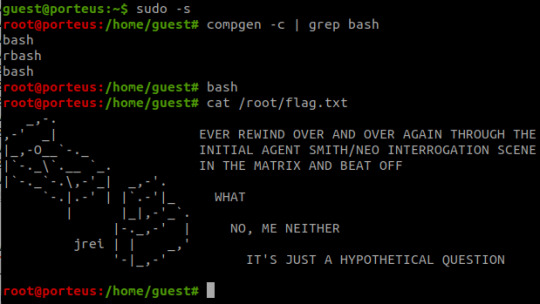
It is rated as medium to hard, however I don't feel there's any real difficulty to it at all.
Initial Foothold
Run the standard nmap scans and 3 open ports will be discovered:
Port 22: SSH
Port 80: HTTP
Port 31337: Elite
I began with the web server listening at port 80.

The landing page is the only page offered- directory enumeration isn't possible as requests to pages just time out. However, there is the hint to "Follow the White Rabbit", along with an image of a rabbit on the page. Inspecting the image of the rabbit led to a hint in the image name- p0rt_31337.png. Would never have rooted this machine if I'd known how unrealistic and CTF-like it was. *sigh*
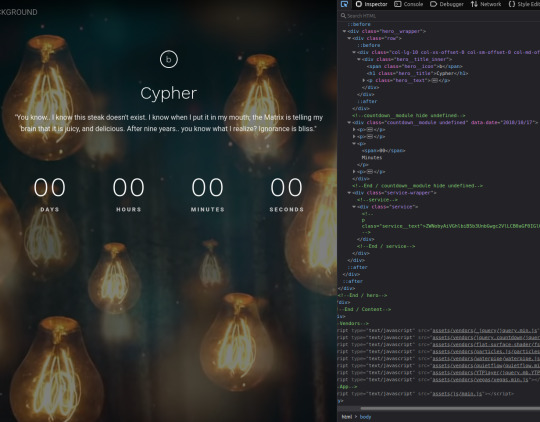
The above is the landing page of the web server listening at port 31337, along with the page's source code. There's a commented out paragraph with a base64 encoded string inside.
The string as it is cannot be decoded, however the part beyond the plus sign can be- it decodes to 'Cypher.matrix'.

This is a file on the web server at port 31337 and visiting it triggers a download. Open the file in a text editor and see this voodoo:
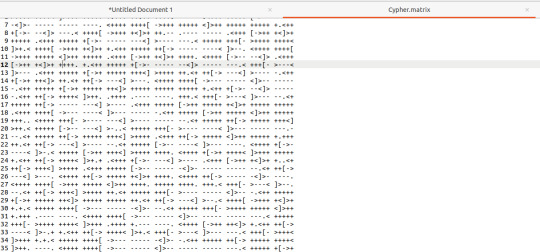
Upon seeing the ciphertext, I was immediately reminded of JSFuck. However, it seemed to include additional characters. It took me a little while of looking around before I came across this cipher identifier.

I'd never heard of Brainfuck, but I was confident this was going to be the in-use encryption cipher due to the similarity in name to JSFuck. So, I brainfucked the cipher and voila, plaintext. :P
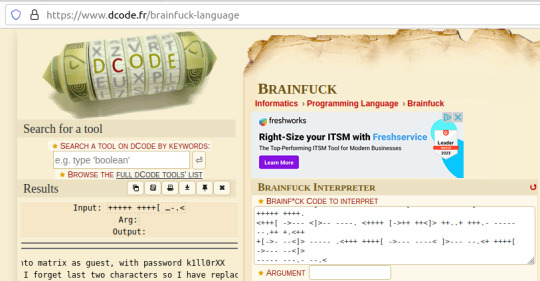
Here, we are given a username and a majority of the password for accessing SSH apart from the last two character that were 'forgotten'.
I used this as an excuse to use some Python- it's been a while and it was a simple script to create. I used the itertools and string modules.
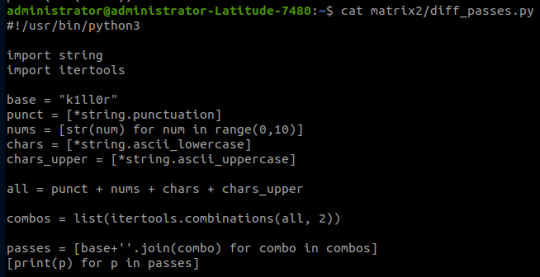
The script generates a password file with the base password 'k1ll0r' along with every possible 2-character combination appended. I simply piped the output into a text file and then ran hydra.

The password is eventually revealed to be 'k1ll0r7n'. Surely enough this grants access to SSH; we are put into an rbash shell with no other shells immediately available. It didn't take me long to discover how to bypass this- I searched 'rbash escape' and came across this helpful cheatsheet from PSJoshi. Surely enough, the first suggested command worked:

The t flag is used to force tty allocation, needed for programs that require user input. The "bash --noprofile" argument will cause bash to be run; it will be in the exec channel rather than the shell channel, thus the need to force tty allocation.
Privilege Escalation
With access to Bash commands now, it is revealed that we have sudo access to everything, making privilege escalation trivial- the same rbash shell is created, but this time bash is directly available.

Thoughts
I did enjoy working on Morpheus- the CTF element of it was fun, and I've never came across rbash before so that was new.
However, it certainly did not live up to the given rating of medium to hard. I'm honestly not sure why it was given such a high rating as the decoding and decryption elements are trivial to overcome if you have a foundational knowledge of hacking and there is alot of information on bypassing rbash.
It also wasn't realistic in any way, really, and the skills required are not going to be quite as relevant in real-world penetration testing (except from the decoding element!)
#brainfuck#decryption#decoding#base64#CTF#vulnhub#cybersecurity#hacking#rbash#matrix#morpheus#cypher
9 notes
·
View notes
Note
Can you please clarify "Chapter Books" for me? It's not a category on QueryTracker so would it be put inside the general "children's" category? Also, what's a typical word count for an early chapter book? Lastly, is there even a market for chapter books? Thank you.
I know for a FACT you didn't ask me for the word count of a chapter book when I DON'T. ANSWER. WORDCOUNT. QUESTIONS. And when I literally posted a cheatsheet to chapter books -- WITH WORD COUNT -- less than 48 hours ago. I know you scrolled A LITTLE bit. I just *know* you did. (If anyone else out there didn't, though, here's the cheat sheet again.)

For anyone else trying to come at me with word count questions do me a favor and STOP. Read this post. Literally all I know about word counts is in this post. It's BY FAR the most popular thing I've ever written, it's probably the first thing that comes up when you google "children's book word count" or some such, and I have nothing else to add. If you have further questions ("but what about THIS random sub-sub-sub-genre of whateverthehell") -- just find some comp titles -- OTHER BOOKS PUBLISHED IN THE SAME GENRE OR CATEGORY -- look up their word count -- and AIM FOR SOMETHING IN THE BALLPARK OF THAT WORD COUNT. Sorry, I hate to go off, but GOOD GOD ALMIGHTY I DO NOT CARE ABOUT YOUR WORD COUNT, MAKE IT THE LENGTH OF A BOOK, WHAT'S NOT CLICKING????
OK. OK. Now that's out of my system. Ahem.
"Chapter Books" is not a category on Query Tracker, you're correct. You can click "Children's Book" or "Middle Grade" and just specify that you are querying a chapter book series. Pretty much any agent who reps "children's books" or "middle grade" will also rep chapter book series, unless they specifically say that they do NOT want chapter books.
There is not a huge market for Chapter Books -- but then again, I have sold a lot of them, so... ??? I dunno.
My pro tips -- read the sheet sheet above. Then read A LOT of chapter books. (No, honey, more than that.)
Your chapter book *must* have a strong central character(s) AND/OR some kind of high-concept "hook". (Realistic stories tend to have a strong central character and follows them book to book -- think Judy Moody, Alvin Ho, Jasmine Toguchi, Ivy and Bean -- fantasy-type stories tend to have a high concept hook that may or may not have the same characters in every book, like vet's office who takes care of magical creatures, rescue dog who goes back in time to save kids in peril, a school for villains, survival stories from major disasters, etc).
Your chapter book *must* have series potential. (I have only ever sold chapter books in multi-book deals, usually 3, 4 or 6 books. Publishers are not interested in one-offs for this age level. I would suggest you write the entire first book, and a proposal for other potential books in the series. This proposal can be just a page -- a paragraph talking about what the series IS, and then a little paragraph for each potential book. This can be a separate document, or at the end of the first book document.)
You must be prepared to write chapter books quickly. (Publishers buy them in multi-book deals because they often want the first two books to come out simultaneously or within a very short time frame, and they want multiple to come out in a year. If you know you are a slow writer, that might be a problem! Luckily, though, they are shorter than regular novels, so...)
Your advance will not be high. (Margins are VERY low on chapter books because they are mostly sold in paperback and are low-priced. So your advance will reflect that. And you may have to share royalties with an illustrator.)
Good luck!
7 notes
·
View notes
Text
Hi new readers!

First of all - welcome! I'm so happy that you're here. It's been a pleasure seeing new followers and readers discovering this fandom!
I know I'm not the only writer who has noticed some changes in the level of interaction in the fandom these couple of months. As someone relatively new to the fandom myself (it will be one year in March), I thought I'd post this cheatsheet for newer users who might not be familiar with this community.
1. Please reblog!
This is the primary way you find content and fics on Tumblr - please reblog freely and often! Content creators and writers spend their precious free time producing content for free. All we ask for is you share our work. While likes are nice, you are not sharing content by just liking content.
You don't even have to add anything to a reblog - a blank reblog is definitely more helpful than a like.
2. Feedback is very much appreciated!
If you are able to, please leave feedback for fics. It can be a comment, a reblog, tags in a reblog, or a gif - it means the world to have meaningful interaction with readers. It doesn't need to be a literary review, even a short comment or a keyboard smash is appreciated and will keep writers going.
3. If you want to stay anonymous, send in asks!
Anonymous or not, asks are always appreciated! But especially for readers who want to stay anonymous, send in asks to interact with writers.
4. Please interact with completed works!
I'm really feeling this one - I've had so many readers serial like their way through Consent, but literally just one or two users have left feedback in the last few months. Even if a fic is completed, no matter how long ago, writers would love to hear from you!
Same deal for fics that have not been completed, but haven't been updated for a while - leave reblogs and comments to encourage the writer to keep going!
5. Please be kind!
We are all human behind our accounts. Often we are writing late into the night after our full-time jobs, or giving up free time for writing. So please be kind when you reach out to writers, as you would anyone you meet in real life.
Thanks for reading! If you have any questions, my inbox is open.
75 notes
·
View notes
Text
POSTS FOR YOU - 1
Some links to posts with valuable content you want in one place.(BASICALLY EVERYTHING IS THERE)
Suggestions and Recommendations are appreciated and accepted.
Last Updated : 16/10/2020
NOTE: Some of these post are written in a crude and unruly fashion. But they contain valuable tips, guidance and information. If you can't/don't want to read such posts, then don't read.
Mental Health
Do you need a Hug?
Maybe you’re having a stressful day. Maybe you just need a deep breath. Maybe you just didn’t realize how stressed you are. You can get your comfort here.
Some stuff to help you sleep
This is definitely not a google drive full of the sleep stuff from the Headspace app, including sleepcasts, music, and wind down meditation, that normally costs 17.99 a month, no siree and you definitely shouldnt share this with people
Anti-Anxiety Tools
Some tools to help you before, during or after an anxiety attack
100 Reasons NOT To Kill Yourself
READ IT. SHARE IT. REBLOG IT. Save a Life.
HOBBIES MASTERPOST!!!!!!!!
A really excellent way to reduce anxiety is to pick up a new hobby. Find something you’re interested in, learn it, then use it as a healthy and productive way to cope.
Health
Some very Important Lists for Rating PAIN, FATIQUE AND MENTAL HEALTH
It is MUST share
PSA Rregarding Hospital bills
Also how to pay hospital bills when you are broke.
How to differentiate between COVID-19, FLU AND COMMON COLD
Anyway, as we enter cold & flu season in the YEAR of corona, this will come in very handy.
Treatment for HIV
VERY IMPORTANT. Please Read and Share.
What does the Color of your Period mean?
A must read for individuals who get periods.
How to differentiate between Period Cramps and Appendicitis
A MUST READ
From a Person who is Hard of Hearing
Types and levels of deafness
General Tips for Vagina Health
Some stuff they don't teach in sex-ed.
Undo the damage of Sitting
Are you always sitting down? Then these are some exercise you should probably try out for better health.
Guide to Proper Bra Fitting
Guide to Proper Bra Fit and Measuring. Please Read and Share.
Washable, Reusable Menstrual Pads
(Part II)
Reusable menstrual hygiene product, and are an alternative to disposable sanitary napkins or to menstrual cups.
Artists
Art Masterpost
How to draw *insert whatever you want, its there in the list*?
Book Binding
Some video links to different types of DIY Bookbinding
For Artists who Need Photoshop
If youre an artist who cant afford photoshop, definitely DO NOT go to this google drive to pirate the program, that would be so bad!!!
Do’s and Don'ts of Designing for Accessibility
Please consider this when designing for ANYTHING. For BUSINESSES and ARTISTS.
Writers
Color Synonyms
For both ARTISTS and WRITERS
How to make a Masterlist
Simple but efficient instructions to make a masterlist
ULTIMATE NOVEL WRITING RESOURCE MASTERLIST
This is an ultimate masterlist of many resources that could be helpful for writers.
List of AUs and Ship Tropes
For when you run out of ideas.
AUs
Ship Tropes
Legal sites to get some much needed Info
If there was only a way to find out all of this rather edgy information without getting yourself in trouble…
Resources for Describing Characters
For writing about physical appearances, character traits, talents,and skills and other related stuff of your characters, here is a comprehensive list.
Resources for Describing Emotions
Having trouble writing jealousy, happiness, motivation. Here you go!!
Some Resources for your Writing
Body Language
Reverse Dictionary
Character Traits
Things to Keep in mind when naming Characters
Valuable advice. Trust me
Words to Use when Writing Smut/Romance
This is for smut/romance writers. Kinda like a thesaurus.
Tips to write Pain
How are you supposed to write about pain you’ve never experienced before?
References for Greek Mythology Characters
Link to an extensive site every single detail of Greek Mythology from Gods to Family Trees.
Tips to write Blind Characters
Some tips that might be invaluable when writing character that are near-blind or blind
Things to Remember when writing a Highly Emotional Scene
Just small things that could make a great difference
How to write with Multiple POVs
Tips on how to write multiple POVs with diverse characters
Synonyms and Antonyms
The person who made this list is a blessing to writers. Just saying.
Good Qualities for Female Characters
Females don't always need to be protected and be weak. Make them more realistic.
Words to Use instead of ‘Said’
Every single situation is listed. Check it out.
Limits of the Human Body
All extremities listed
Readers
Legal Sites to Download Literature
From children’s books to rare books, from philosophy and religion to nonfiction. I guess you can find anything here.
The Rights of the Reader
And some (lots of) bashing of Helicopter Parents.(You want to read only the rights. Here it is)
Wet Book Rescue : Steps to save a Wet Book
Valuable information if some of your prized books were affected by recent flooding. The video even shows you what to do if you can’t dry the book out right away.
Cheatsheet to Navigate AO3
Makes your time on AO3 a little more easier and interesting
How to trick Writers into giving you More Fanfic to read
Works for Comics and Art as well.
Get a Book Suggestion
This book website gives you the first page of a random book without the title or author so that you can read it with no preconceptions
Books written by POC Writers
Only POC authors included in the list.
Students
Basic ASL (American Sign Language) Movements
ASL Hand Movements for beginners.
Tips for studying with ADHD/a>
Made by a person with ADHD themself.
Resources to Learn New Languages
Ten fairly useful general language resources
How to properly take notes
It helps. It really helps.
FREE ONLINE LANGUAGE COURSES
Here is a masterpost of MOOCs (massive open online courses) that are available, archived, or starting soon. I think they will help those that like to learn with a teacher or with videos.
A Thread of Tips
A thread of tips to help High School and College students academically
LEARN THINGS FOR FREE
FREE ONLINE COURSES (here are listed websites that provide huge variety of courses)
Google like a BOSS
Some life hacks which make student's lives easier.
625 words to know in your Target Language
If your learning a new language, these words will help you build a strong foundation.(Some tips and sites are include too)
Miscellaneous/Life Hacks
How to add music to your Blog
How to add your very own, custom homemade playlist to your blog?
How to Walk with Purpose?
Some tips on how to hold yourself in public and why.
Cheatsheet for Laundry Rooms
Saves a lot of money in the Laundry Room
How to Gird up your Loins?
A lesson in how to gird your loins.
How to Disappear Online
Please read and spread for the sake of abuse victims or stalker victims.
What to do during a Nuclear Attack
I hope you never have to use it but here are some guidelines to follow in the event of a nuclear attack
How to pull an All-Nighter.
A to-do list
Write a Thank You letter after your Interview
It leaves a good impression on your interviewer and increase your chances of passing the interview.
Laundry Tags: Meanings
A life hack that you’ll definitely need at some point.
Where to find free Movies and Series Online
Lots of sites. Lots and Lots of sites. I am not Kidding. Now go and chill without netflix. (Part II)
How to get a Refund?
Get your stuff or a refund.
HOW TO DO EVERYTHING FROM SCRATCH
This starts at the most absolute basics of gardening and planting, provides definitions, and hopefully is easily understandable. This is a MUST-READ. (Farming)
Discuss your wages
It’s your right to share your salary, not doing so could be holding you back.
Youtube Tutorials for Basically EVERYTHING
This is a big, giant list of Youtube tutorials that will teach you all the basic life skills you need to know in order to be a functional adult.
Safety
Emergency Evacuation - Items to Gather
A text list of suggested items to acquire in the event of an emergency.
If someone you know is in an abusive relationship
AN ABBREVIATED GUIDE TO ‘Holy shit!!! My friend is in an abusive relationship what do I do’ and what not to do.
Defense Tips for Women
Defense and Safety tips a woman MUST know. (Part II)
An app that informs your Emergency contacts if you are inactive in a set period of time.(Could prevent rape attempts if used correctly)
If a Man gets Physical
How to check if a mirror is one way or two-way
If you are trapped in a smoke-filled apartment: What to Do
How to get out of Hand-binds
How to get out of the bunker of a Car
How to track Anonymous asks.
How to pick a Lock
Traits and Warning signs of an Abuser
What to do if a bigot pulls your Hijab (from behind)
What to do if someone pulls of a Muslim Woman's Hijab? (To do List for both Men and Women)
563 notes
·
View notes
Photo
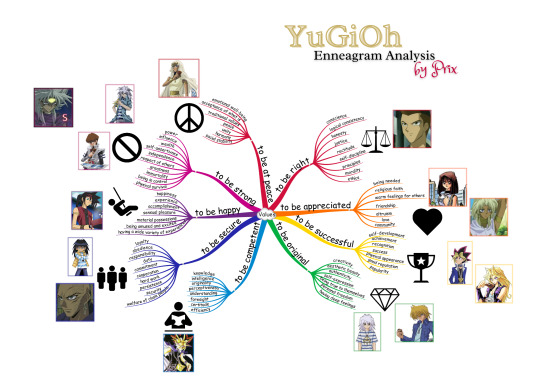
[ID: A chart describing the core values of each of the nine Enneagram personality types with YuGiOh characters correlated to each of the types.]
YuGiOh Enneagram Analysis, Part #1
Please note that this is the “boring” informational post about Enneagram with the Types listed and explained as well as a few other things. The next post is what has the actual, in-depth character profiles promised!
Introduction & Motivation
Over the past several months, I have been trying to analyze my strengths and weaknesses as a writer and learn more. I have been writing fanfiction since I was a little kid, making my first FF.net account in 2003 when I would have been twelve years old. Even before that, I was a lurker and wrote fics to share with my childhood best friend on paper or floppy discs.
YuGiOh came into my life at some point shortly thereafter. I know this, because I spent my thirteenth birthday in a comic book shop, mostly watching some of my male friends play the trading card game. I had some of the cards, but I was never much of a player, unable to keep up with the seemingly rapid rule changes. Besides that, I was always way more interested in the story and characters than I was in the card game. I remember I even wanted to call “YuGiOh cards” “Duel Monsters” instead to make it seem a little closer to tween-y LARPing.
Eventually, I gave up on collecting cards or trying to ply the game. I felt that while my male friends didn’t mind me being around when they played, they weren’t extremely interested in helping me learn or keep up. I felt I had other strengths, so I started carrying around a notebook even more than I already did. I started my fledgling forays into online fandom. And YuGiOh was a big part of the beginning of that.
I can’t remember posting any YuGiOh fic in particular, and I’m sure that if I had it would make me cringe now. What I do remember is reading some and also spending a lot of time lying on my bed, headphones plugged into a small purple stereo, listening to the first of the two American-released CDs with YuGiOh-inspired music on them. In particular, the last three tracks were pieces of music from the original score composed for the 4Kids dub, which is - for some reason - different from the original Japanese music.
During that time, I would fantasize and conjure my own YuGiOh plots in my head, most of which were focused on the Ancient Egyptian and more spooky, spiritual, and horror themes in the show. I was really fascinated with the reincarnation angle, though my understanding of and opinions on how that works have grown with time.
Years went by, and I didn’t think about YuGiOh much at all. Then, something happened in 2018. I don’t know what got in my head, but it was like all the joy I once found in thinking about the YuGiOh characters came back in a giddy conversation with my childhood best friend. Then, for a little while, it wouldn’t leave me alone.
I started writing for the fandom then, and after several detours, I’m trying to get back in the groove of it.
My approach to the tone of YuGiOh-fanning is that it’s a bit serious, but it’s also with a tongue placed in my cheek because of how incomprehensible or silly the plot can be on a meta level. Sometimes, it almost brings tears to my eyes by being so over-the-top about something that, in the real world, would make no sense at all. But the drama, in the context of the universe, somehow rings true.
I think that’s all owing to how most of the primary characters are just... really freaking great characters.
It has often puzzled me. Like, did Takahashi do all this layering on purpose? Is it really there, or did earnest fanon just make it seem like it? And, as a person, I am always here for a good fan-and-canon symbiosis.
This post is going to be, from here on, an effort to match the YuGiOh characters to the 9 Enneagram Personality Types. I am writing this for my own benefit as I continue to work on my pet YuGiOh fanfiction project, It’s Always Sunny in Domino City, which is a mixture of YGOTAS-vibes-and-concepts taken seriously and a sincere take on fanfiction for the actual canon. It’s dramedy about a sizeable chunk of the main cast a few years post-canon with some canon divergence such as the Memory World arc not yet and possibly never-happening. If that sounds like something you’d like, I would humbly request you check it out!
Either way, this will be an in-depth character analysis cheatsheet for all of the characters above, based on my observations, opinions, and feelings. I invite discussion, but it’s fine if we need to agree to totally disagree!
If you are interested and enjoy what’s below the Read More and in the coming second post, then you are welcome to utilize the character analyses to aid you in your own fanwork!
Enneagram
What is Enneagram, and why am I using it?
Enneagram is a personality categorization system that one might compare to the somewhat better-known MBTI. However, in the words of excellent writing-advice YouTuber, Abbie Emmons:
MBTI shows us how we behave.
Enneagram shows us what we believe.
I will be referencing Abbie’s video Using The ENNEAGRAM To Write CONFLICTED CHARACTERS and her free Enneagram-cheatsheet, available in the description of the linked video. Whether it’s before you continue reading or after, if you’re interested in writing, I would highly recommend you check out her channel!
The Enneagram system has nine basic personality types that overlap and interact in really interesting ways. It is not a hard science, and it’s not a horoscope. Instead, it’s supposed to be “based on conventional wisdom and modern psychology.” All I can say is that with every set of characters I’ve tried it with, it works! Once you get the hang of it, it feels kind of like ~✰~magic~✰~!
Below, I will list Abbie’s simplified definitions of each of the personality types, in order:
Type 1: The Reformer
The Rational, Idealistic Type:
Principled, Purposeful, Self-Controlled, and Perfectionistic
Basic Fear: Of being corrupt/evil, defective
Basic Desire: To be good, to have integrity, to be balanced
Key Motivations: Want to be right, to strive higher and improve everything, to be consistent with their ideals, to justify themselves, to be beyond criticism so as not to be condemned by anyone.
Type 2: The Helper
The Caring, Interpersonal Type:
Generous, Demonstrative, People-Pleasing, and Possessive
Basic Fear: Of being unwanted, unworthy of being loved
Basic Desire: To feel loved
Key Motivations: Want to be loved, to express their feelings for others, to be needed and appreciated, to get others to respond to them, to vindicate their claims about themselves.
Type 3: The Achiever
The Success-Oriented, Pragmatic Type:
Adaptable, Excelling, Driven, and Image-Conscious
Basic Fear: Of being worthless
Basic Desire: To feel valuable and worthwhile
Key Motivations: Want to be affirmed, to distinguish themselves from others, to have attention, to be admired, and to impress others.
Type 4: The Individualist
The Sensitive, Introspective Type:
Expressive, Dramatic, Self-Absorbed, and Temperamental
Basic Fear: That they have no identity or personal significance
Basic Desire: To find themselves and their significance (to create an identity)
Key Motivations: Want to express themselves and their individuality, to create and surround themselves with beauty, to maintain certain moods and feelings, to withdraw to protect their self-image, to take care of emotional needs before attending to anything else, to attract a "rescuer."
Type 5: The Investigator
The Intense, Cerebral Type:
Perceptive, Innovative, Secretive, and Isolated
Basic Fear: Being useless, helpless, or incapable
Basic Desire: To be capable and competent
Key Motivations: Want to possess knowledge, to understand the environment, to have everything figured out as a way of defending the self from threats from the environment.
Type 6: The Loyalist
The Committed, Security-Oriented Type:
Engaging, Responsible, Anxious, and Suspicious
Basic Fear: Of being without support and guidance
Basic Desire: To have security and support
Key Motivations: Want to have security, to feel supported by others, to have certitude and reassurance, to test the attitudes of others toward them, to fight against anxiety and insecurity.
Type 7: The Enthusiast
The Busy, Variety-Seeking Type:
Spontaneous, Versatile, Acquisitive, and Scattered
Basic Fear: Of being deprived and in pain
Basic Desire: To be satisfied and content—to have their needs fulfilled
Key Motivations: Want to maintain their freedom and happiness, to avoid missing out on worthwhile experiences, to keep themselves excited and occupied, to avoid and discharge pain.
Type 8: The Challenger
The Powerful, Dominating Type:
Self-Confident, Decisive, Willful, and Confrontational
Basic Fear: Of being harmed or controlled by others
Basic Desire: To protect themselves (to be in control of their own life and destiny)
Key Motivations: Want to be self-reliant, to prove their strength and resist weakness, to be important in their world, to dominate the environment, and to stay in control of their situation.
Type 9: The Peacemaker
The Easygoing, Self-Effacing Type:
Receptive, Reassuring, Agreeable, and Complacent
Basic Fear: Of loss and separation
Basic Desire: To have inner stability, "peace of mind"
Key Motivations: Want to create harmony in their environment, to avoid conflicts and tension, to preserve things as they are, to resist whatever would upset or disturb them.
Now that you’ve seen all those, what do you think your favorite character is? In YuGiOh or anything else! It works great for original characters and even yourself and your loved ones.
The actual Character Profiles will be in coming post(s), but continue reading if you want me to explain more about how and why the Enneagram is a great personality typing system. #nonspon, or whatever.
The Enneagram Chart
Now, you could just go to the Enneagram Institute’s page on How the System Works, but below I’ll cut it down to only the parts I’m interested in and explain those in a way that helps me.
Unlike in astrology or MBTI, which are both more restrictive in different ways, the relative position of each type matters a bit on the Enneagram chart, because it can be used to visualize a lot of things about a person!
The Basic Chart
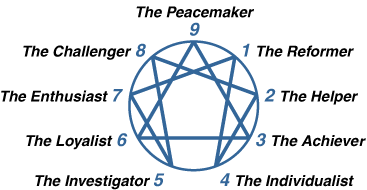
The Types are shown in a clockwise fashion with “1″ in the 1 o’clock position on an analog clock. The interior lines mean things, but I have trouble reading it without further delineation.
Centers of Response
Below are two small charts, displayed side-by-side. (If it’s too small, try right-click, open in new tab!)
The chart on the left shows the three “centers.” The “centers” indicate the first ‘processing language’ a person would use to respond to stimuli.
Type 8, Type 9, and Type 1 respond first based on instinct (primal, gut-feeling). If you want to go Freudian, this is from the id.
Type 2, Type 3, and Type 4 respond first based on feelings (social or personal desires, the heart). If you want to go Freudian, this is from the ego.
Type 5, Type 6, and Type 7 respond first based on thoughts (analytical rather than emotional, the head). If you want to go Freudian, this is from the superego.
Remember that, of course, every single type and person engages their instincts, their emotions, and their thoughts at different times and to different degrees, and some of these are learned or changed behaviors. This is about what their innate drive toward that would be.
Likewise, the same “centers” can also be used for the chart on the right. You will notice that all three of these are defined by what is typically considered a negative emotion. This is because this is about a person’s instinctive, not particularly conscious emotional response when they are backed into a corner and deprived of something that is core to the needs of their personality type.
Type 8, Type 9, and Type 1 tend to respond to a threat to their psychic well-being with anger/rage.
Type 2, Type 3, and Type 4 tend to respond to a threat to their psychic well-being with shame.
Type 5, Type 6, and Type 7 tend to respond to a threat to their psychic well-being with fear.

Stress vs. Growth
We all know that there are times when a person isn’t acting like themselves, for better or for worse. Usually, “You’re not acting like yourself,” means that a person is behaving badly. Of course, it’s way easier to withdraw and bristle and defend rather than growing in the midst of adversity. However, it is certainly possible to experience character growth in response to experiences, good and bad. Unlike a lot of other personality typing schemes, the Enneagram has a way to display and predict what stress and growth do to a person.
The Enneagram never suggests that any Type is an island unto itself. Every person contains multitudes, but a person’s Type is likely to remain relatively stable throughout their lives, once they have had a chance to develop any personality at all. This means that when a person is stressed or growing that they do not become the type they emulate. Rather, they are more highly expressing that aspects of their personality that reflect those drives and desires but in a way that is either fraught, sickly, or unwell (in the case of stress), or aspirational, flying-high, and incorporating the hard-lessons into who a person is going to be going forward (in the case of growth). The latter, especially, isn’t a sustainable mode, while a stressed person can become more entrenched in their bad habits and defensive coping mechanisms.
Stress

Note the white, directional arrows. Each number has an arrow point pointing to it and an arrow leading away from it. The point indicates that this is the stress manifestation for the Type at the origin of that arrow. The origin of each arrow indicates the Type being described.
Confused? Let me finally give you a YuGiOh example.

When I was trying to identify the Types of the characters, defining Marik was difficult, because he has a “Yami,” or Dark Side, which has its own personality and will but which is not its own separate soul or person than Marik himself. Rather, it’s a kind of fantasy/magic-assisted personality splintering where Yami Marik is a full manifestation of the negative traits Marik needed to embody to survive.
So, for reference:
When stressed, Type 1 behaves more like Type 4.
When stressed, Type 2 behaves more like Type 8.
When stressed, Type 3 behaves more like Type 9.
When stressed, Type 4 behaves more like Type 2.
When stressed, Type 5 behaves more like Type 7.
When stressed, Type 6 behaves more like Type 3.
When stressed, Type 7 behaves more like Type 1.
When stressed, Type 8 behaves more like Type 5.
When stressed, Type 9 behaves more like Type 6.
Alternatively, you can use these sequences to follow the stress lines:
1-4-2-8-5-7-1
9-6-3-9
Growth
Think of the above-explanation in reverse.

The sequence:
1-7-5-8-2-4-1
9-3-6-9
As a Type 1 grows, they incorporate more positive traits of Type 7.
As a Type 2 grows, they incorporate more positive traits of Type 4.
As a Type 3 grows, they incorporate more positive traits of Type 6.
As a Type 4 grows, they incorporate more positive traits of Type 1.
As a Type 5 grows, they incorporate more positive traits of Type 8.
As a Type 6 grows, they incorporate more positive traits of Type 9.
As a Type 7 grows, they incorporate more positive traits of Type 5.
As a Type 8 grows, they incorporate more positive traits of Type 2.
As a Type 9 grows, they incorporate more positive traits of Type 3.
Wings
The final thing to know about the Enneagram chart for my purposes is about wings. The wing of your personality traits accounts for the complementary and contradictory aspects of your personality. They are the inconsistencies that make you human, predicted and jumped in. Typically, a person is not thought to have both possible wings but one or the other. A wing is one of the two adjacent Types to yours, the number before, or the number after, and it is annotated, for example:
Type 1, Wing 2: 1w2
Type 1, Wing 9: 1w9
Link to Part 2 Here!
#yugioh#yugi mutou#seto kaiba#jounouchi katsuya#yugioh duel monsters#mutou yugi#kaiba seto#kaiba mokuba#mokuba kaiba#kujaku mai#mai kujaku#anzu mazaki#mazaki anzu#katsuya jounouchi#marik ishtar#isis ishtar#rashid ishtar#hiroto honda#honda hiroto#ryou bakura#bakura ryou#yami bakura#yami marik#yami yugi#pharaoh atem#atem#ryuji otogi#otogi ryuji#main cast#op
38 notes
·
View notes
Note
Hi there! New follower here, hello! I just had my hysterectomy a few months ago and the thing that surprised me the most was how tired and disoriented the recovery pain meds made me for the first week following and how sore I felt using the toilet the first couple days following. I'm sure you've seen this in the paperwork somewhere, but you'll need someone to pick you up afterwards since you wont be able to drive; HAVE THIS PERSON TAKE NOTES. Any important meds information should already be written on the bottles/cheatsheet, but if the doc has anything to say to you afterwards, especially when you're just waking up, you may not remember it, so your helper should write it down so you can review it afterwards when you are more conscious!
My core muscles were VERY sore and weak even almost two weeks afterwards, try to figure out beforehand what the best way to get in and out of a laying-down position is for you. For me it was using my arms to roll onto my side, pushing myself up into a sitting position while my feet dangled off the bed/couch, then standing from there. If you can get help with this the first few times, do. If you can set up a sturdy chair/cane/walker by your bed so you can do it more easily independently, that will be helpful. (Especially because for me I needed to get up to pee and take meds frequently the first week!)
//cw blood/gore implied: The first time I had to change my bandages (your doctor will tell you when that is, for me it was about a week after, so the staples could dissolve) I got extremely nauseus from the sight of the surgical sites and needed to sit down and have someone help me. Even if you are normally okay with seeing that, consider sitting down and/or having help on-standby if you can!
Also, if you have any questions at all at any point in preparation or recovery, call the nurse line! They are there to help you.
Wishing you the best and feel free to dm if you have any more specific questions!
Thank you so much!
24 notes
·
View notes
Text
The other thing I want to take over (well, like everything because most people are incompetent and it's easier to do it myself than deal with aggravation) is because we do not have at least the major department I work in well documented.
For instance, we have a spreadsheet with names we use for each client who uses ach. We have no such list for checks despite the fact we all have to find the checks that we've processed on a giant list of department processed checks which is sorted by name -- so no, there is no coordination.
Also, there is no procedures file or manual. Just notes, which cover only things that occurred to my boss, which is to say most of what you'd need is missing, set in weirdly colored excel sheets that actually make it harder to read, using terminology that you don't know unless you already know how to do it.
Now, *I* write step by step instructions for every process I learn. Because I hate to look stupid asking a question I should already know, not any sense of organization.
In the past I have taken this, streamlined the language and format -- I am a writer, I know how to be clear, I just don't bother here -- and built training manuals, complete with a section of commonly needed cheat sheets and corresponding shared drive files, so you can use the manual when you start and make a paper copy of the cheat sheet if you like that or have a doc of it on your computer if you prefer. It has never failed to improve training and overall efficiency.
But pretty sure I'm gonna get told "we've always done it this way" and I'm gonna be seen as the problem child, especially because I could tell them a couple dozen things to fix within my first two weeks.
(BTW, the other department I've trained in at all, I'm never in, does have a cheatsheet for one thing... in size 6 font. Yeah)
And where in my foolish youth I just put it together in my off time and gave it toy boss, so I could demonstrate the advantage -- no one has to use it but it's available for people who need it. Which means you're saving everyone time and reducing errors from people guessing because they were too embarrassed or didn't know to ask.
Now? I'm happy to do all of it... on the clock, after hiring me on directly. With a raise since they no longer have to pay the agency.
How long does one have to wait before saying "this is all mess, give me an extra $5 an hour and I'll double your production while making workers lives easier."
(Any boss tells you that can't happen, I figured it out at 19 with no business experience or education, yes it most definitely can. And the company even saves money because staff turnover goes down unless someone is a dick -- in which case, regardless of position, get rid of the dick. That lesson came directly from the owner when I was 19 and said I was quitting now because my boss was a bitch with specifics, so he fired her. That man was the CEO of a Fortune 500 company for decades.)
But somehow I think that will end badly after two weeks, even though the problems are that apparent.
This is why people hate working for corporations-- they do fucking stupid things stupidly abd no one stops them.
2 notes
·
View notes
Text
3 Steps for How to Find Time in Your Schedule for Writing

Sometimes we can have all the creativity in the world but feels as if there’s no free time for us to get our ideas down on paper. You may be finding that you have less time to write than you thought this month, but never fear! Novelist Sagan Morrow is here to help us get a writing schedule ready to go:
Just because you want to write a book, doesn’t mean it’s easy to find the time to actually do it! We all have busy, hectic lives… so, how can you carve out time in your schedule for writing?
As a productivity strategist and romance novelist, I get this question a lot from my clients and aspiring authors. It comes down to learning how to stay disciplined, and also putting together strategies that are the right fit for your unique situation and writing style.
Here are three actionable steps (plus corresponding pro tips!) you can implement today to find time in your schedule for writing.
1. Create a plan of action.
Look at your upcoming schedule for the next few weeks and/or months. What non-negotiables have you already scheduled? What tasks can you shift around, to make more room for writing? Make a note of which days you’ll spend writing, and set deadlines for yourself in terms of when you’ll complete each draft.
If you don’t know your writing pace, try using a time-tracking software like Toggl to track where your time goes and calculate roughly how long it takes you to write 500 or 1,000 words. That will give you a more accurate idea when setting your timelines.
Not sure what this plan of action could look like for you? Here’s an example of a step-by-step process I used to write my first romance novel in less than two months.
Tip: Be honest and patient with yourself! Everyone writes at a different pace, so honour what that looks like for you.
2. Build habits and routines.
Now that you’ve chosen which days you’ll work on writing your book, you can also take a look at what time of day you’ll write. Block that time off in your schedule.
Building habits and routines around your writing time can also help “prime” you for it: for example, if you have a particular playlist you always listen to, or if you know that your writing time comes after you’ve made coffee and done yoga first thing in the morning, then the habit and routine of it will make it that much easier to get into writing mode on a regular basis.
Tip: Ground this in energy management. When you identify your most creative times of day, you can use that time to your advantage! You’ll write faster and produce higher-quality work when you write according to your energy and creativity levels.
3. Document your progress.
Motivate yourself by documenting the progress you make! I like using a word count tracker spreadsheet to organize this. This is a great way to stay on track with your writing goals, and to keep yourself accountable and inspired to keep moving forward.
Tip: Make your writing goals manageable. Rather than trying to write 2,000 words every day, aim for 400 words, for example, or set a timer to write for 15 minutes. Every bit counts!
Get more time management tips—and learn how to save 10 hours each and every week—when you grab my time-saving tips cheatsheet at SaganMorrow.com/savetime.
Happy writing!

Sagan Morrow is a romance novelist and shares about her writing journey in the Indie Author Weekly podcast.
When she isn’t writing romantic comedies in her Polyamorous Passions series, Sagan teaches online courses at SaganMorrow.com to empower other solopreneurs as they grow their own successful businesses. She specializes in productivity and time management for multi-passionate creatives.
Learn more & connect with Sagan:
Indie Author Weekly podcast
Sagan’s business books & romance novels
@Saganlives on Twitter & Instagram
Top photo by RODOLFO BARRETO on Unsplash
118 notes
·
View notes
Text

After making a grand total of 11 cheatsheets since starting university less than a year ago (I know, my uni is weird), I wanted to share some of my tips and tricks for making the most effective cheatsheet for your needs! They're a hassle to make, but depending on how you make yours, it could either be an incredibly useful resource or just an extra sheet of paper on your desk.
(By "cheatsheet", I mean a typically printer paper-sized memory aid, usually handwritten, that is allowed to be brought into an exam.)

1. You don’t need to write small, nor do you need to write a lot.
Some people go out of their way to buy 0.1mm pens to cram everything they can onto a cheatsheet. But okay, hear me out: unless you plan on using your cheatsheet to study (more on this later), what is the point of writing as much as you can? It is super difficult to find the exact piece of information that you need in the stressful environment of an exam, especially when you’ve written in the equivalent of size 4 font and your page is cluttered with information you definitely know . And honestly, for most exams, it’s a waste of time trying to look at your cheatsheet. Just put down whatever you’ll definitely need; the rest will only slow you down or overwhelm you.
2. Use colours, or at least find some way to keep it organized.
Once again, you need to spend as little time as possible looking at your cheatsheet in an exam. If the exam allows cheatsheets, the class probably has something else to up the difficulty level of exams. In my experience, it’s usually either application questions or a time crunch, sometimes both. So, make your cheatsheet efficient. Colour-code it so you know what to look for in order to find any given piece of information. Find some sort of format, so that you also know where exactly to look.
3. Don’t wait until last minute to make it. If it comes to that point, just put down the major points and sleep.
There are so many reasons why you shouldn’t do this. Just trust me, my lowest exam marks are from exams where I made a cheatsheet the night before. You shouldn’t be staying up the night before your exam. Copying the textbook onto a sheet of printer paper isn’t effective studying. Most importantly, your cheatsheet becomes so much more effective when you’ve actually done practice exams with it. Or else, how would you know how well it actually functions and what else you should add?
4. It doesn't need to be perfect.
Please don’t spend too much time on your cheatsheet. Obviously, interpret this advice based on practice exams and the scope of whatever course you're taking, but don't get to a point where you're relying on your "perfect" cheatsheet to pass the exam. Instead, spend your time studying the material and question formats so that you almost don't need your cheatsheet. No matter how informative or detailed your cheatsheet is, it won't matter if you don't have time to use it during the exam, or if you haven't done enough practice so you don't know how to format the cheatsheet's information.
5. Don’t worry about what everyone else is doing.
I think this goes without saying for practically anything, really. Just do you. If the prof says you’re allowed a single piece of printer paper, front and back, it doesn’t mean that you need to fill that. Nor does it mean that you should be intimidated when you walk into the exam and see that you’re the only person who hasn’t filled up your cheatsheet completely. Do whatever you need to succeed. If spending a few extra hours cramming information onto your cheatsheet won’t help you, then don’t do that. If it will, then don’t let me and my opinions stop you.

1. For the stuff that you actually don’t know and isn’t worthwhile to memorize
This is pretty obvious, but you should prioritize the stuff that you actually don’t know and is too difficult to memorize. For example, the 20 amino acids for Biology.
2. Diagram compilation
Personally, I think that the most useful thing you can do with your cheatsheet is to add diagrams and charts. They are the easiest thing to find on your cheatsheet. Also, diagrams are able to sum up a whole list of details, so you don’t need to worry about missing something. It is always useful to refer to your diagrams for inspiration!
3. Checklist
What are the three points you need to include to describe a histogram? What steps does the prof want you to do to show autosomal dominance? If you are someone who often loses marks because of missing details or the way you format your answers, your cheatsheet can function as a checklist. Write down exactly what you need to address to get full marks on certain types of questions.
4. Personalized formula sheet
If you are anything like me (ie. I am so afraid of Math that I chose not to major in Biochemistry just so I don't have to do Calc III), then writing out some formulas in the way that you like them written might be useful, even if you are given a formula sheet. It's a comfort thing.
5. Study guide
As a heads up, this is the only situation where I would condone writing as much as possible on your formula sheet. If you're the type of person who studies by copying out your notes (ie. you memorize things by writing them out), then you might as well kill two birds with one stone and just copy your notes onto your cheatsheet. But, then again, your cheatsheet will probably be less functional during the exam, so do this at your own discretion.

Here are two of my own cheatsheets, to illustrate some of my points. The first one is for Biology, the second one is for Statistics.
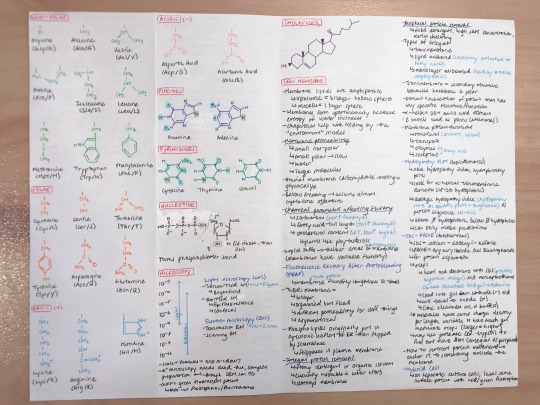
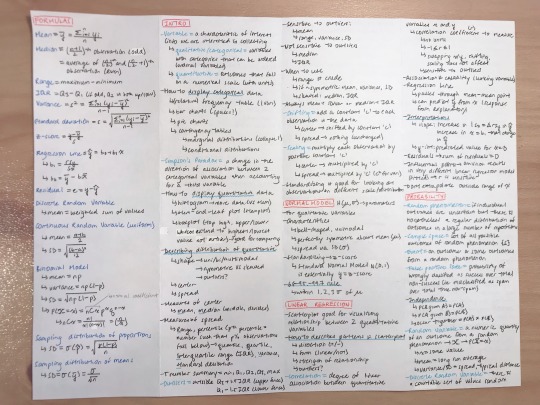
I don’t keep a consistent colour code, but generally, red is for categories or units, blue is for definitions or important terms, and blue underline is for things I commonly forget or refer to (ie. the 4 factors affecting membrane fluidity). The units follow the order that we learned them in class. Although I tend to write small and there is a lot more information than strictly necessary, I can easily find anything I’m looking for.
Here’s the bottom line: do whatever is the most useful for you!! These are just a few things that have worked for me and some people around me, but do whatever will help you succeed.
Happy studying, everyone!
#studyblr#student#studyspo#uni#notes#study#productivity#science#biology#statistics#cheatsheet#memory aid#exam prep#exams#studying tips#advice#mine
1K notes
·
View notes
Text
Hello!
I’m Samantha. Random facts until you get a clearer picture of me:
I love books. My all-time favs are: Throne of Glass - Sarah J. Maas, the Dregs duology and King of Scars - Leigh Bardugo, the Infernal Devices and the Eldest Curses - Cassandra Clare, the Folk of the Air - Holly Black, Miss Peregrine’s - Ransom Riggs
I’m a cat-loving hufflepuff. And I worship Crookshanks.
I write fantasy and fantasy only, though other genres are often incorporated into my stories
I live somewhere in Asia
I’m straight but I support anyone who identifies as LGBT+. You will be forever welcome here.
This writeblr aims to:
provide a larger platform, so more people can read my wip
allow me to have more fun writing
inspire more writing (but I don’t create prompts, merely prod your imagination a little)
TLQ will be released on Wattpad in August [you can find me at awritingcat]. But before then, there’s plenty of goodies I’d like to share with you, here, that readers on Wattpad won’t get to see (unless I decide otherwise, I guess).
So, you must be wondering, what’s TLQ about?
Well, it’s a found family-type trope (yay?) in a science fantasy setting. It takes place on future Earth and the Dome, a place specially created for the story. I have six differing POVs, four female and two male. (We’ll get into this later.) Four of them are immortals, by which I mean they have a quadrupled lifespan of about 400 years compared to the average human lifespan of anywhere from 60-100 years. The story follows their journey as they come together under difficult circumstances to save the world before the determined antagonist ruins it.
Now, that was a little vague. Over the course of the next month, I’ll be revealing more about my characters (these will be titled Character Cheatsheets, or CH^2) and facts about the Dome (these will be labelled Worldbuilding, or Wb). You will get facts, snippets of various drafts in various states of vagueness (but never incorrect grammar), and little secrets that may or may not eventually come up in the story itself.
Every week, you will be shown one Ch^2 and one Wb. These will include the snippets and secrets. When I release them will be completely random. Occasionally, you may see a Bonus post that can include anything from more snippets to completely random out-of-context quotes I came up with in the middle of the night.
I’m new here, and I need accounts to follow. So, if you see this, and post about any of the following, please either reblog (preferred method) or send me a message.
writing tips
WIPs that are about fantasy of any kind, and those that include faeries
WIPs that are about dystopian worlds
WIPs that include LGBT+ characters, because the more I know about this community the more well-written certain characters will be
anything remotely related to writing (even if they’re just hilarious memes and the like)
Thank you so much for reading all the way here, I really appreciate it :)
Edit: A (somewhat) daily section will be uploaded, called Writing Log (or WL). In it, you’ll be able to see how many words I wrote and for which draft and chapter.
Second edit: I’m starting a taglist, so if you want to skip straight to all the TLQ posts, send a message or ask!
9 notes
·
View notes
Quote
The coronavirus outbreak is taking over headlines. Due to the spread of COVID-19, remote work is suddenly an overnight requirement for many. You might be working from home as you are reading this article. With millions working from home for many weeks now, we should seize this opportunity to improve our skills in the domain we are focusing on. Here is my strategy to learn Data Science while working from home with few personal real life projects. "So what should we do?" "Where should we start learning?" Grab your coffee as I explain the process of how you can learn data science sitting at home. This blog is for everyone, from beginners to professionals. Photo by Nick Morrison on Unsplash Prerequisites To start this journey, you will need to cover the prerequisites. No matter which specific field you are in, you will need to learn the following prerequisites for data science. Logic/Algorithms: It’s important to know why we need a particular prerequisite before learning it. Algorithms are basically a set of instructions given to a computer to make it do a specific task. Machine learning is built from various complex algorithms. So you need to understand how algorithms and logic work on a basic level before jumping into complex algorithms needed for machine learning. If you are able to write the logic for any given puzzle with the proper steps, it will be easy for you to understand how these algorithms work and you can write one for yourself. Resources: Some awesome free resources to learn data structures and algorithms in depth. Statistics: Statistics is a collection of tools that you can use to get answers to important questions about data. Machine learning and statistics are two tightly related fields of study. So much so that statisticians refer to machine learning as “applied statistics” or “statistical learning”. Image source : http://me.me/ The following topics should be covered by aspiring data scientists before they start machine learning. Measures of Central Tendency — mean, median, mode, etc Measures of Variability — variance, standard deviation, z-score, etc Probability — probability density function, conditional probability, etc Accuracy — true positive, false positive, sensitivity, etc Hypothesis Testing and Statistical Significance — p-value, null hypothesis, etc Resources: Learn college level statistics in this free 8 hour course. Business: This depends on which domain you want to focus on. It basically involves understanding the particular domain and getting domain expertise before you get into a data science project. This is important as it helps in defining our problem accurately. Resources: Data science for business Brush up your basics This sounds pretty easy but we tend to forget some important basic concepts. It gets difficult to learn more complex concepts and the latest technologies in a specific domain without having a solid foundation in the basics. Here are few concepts you can start revising: Python programming language Python is widely used in data science. Check out this collection of great Python tutorials and these helpful code samples to get started. Image source : memecrunch.com You can also check out this Python3 Cheatsheet that will help you learn new syntax that was released in python3. It'll also help you brush up on basic syntax. And if you want a great free course, check out this Python for Everybody course from Dr. Chuck. General data science skills Want to take a great course on data science concepts? Here's a bunch of data science courses that you can take online, ranked according to thousands of data points. Resources: Data science for beginners - free 6 hour course, What languages should you learn for data science? Data Collection Now it is time for us to explore all the ways you can collect your data. You never know where your data might be hiding. Following are a few ways you can collect your data. Web scraping Web scraping helps you gather structured data from the web, select some of that data, and keep what you selected for whatever use you require. You can start learning BeautifulSoup4 which helps you scrape websites and make your own datasets. Advance Tip: You can automate browsers and get data from interactive web pages such as Firebase using Selenium. It is useful for automating web applications and automating boring web based administration Resources: Web Scraping 101 in Python Cloud servers If your data is stored on cloud servers such as S3, you might need to get familiar with how to get data from there. The following link will help you understand how to implement them using Amazon S3. Resources : Getting started with Amazon S3, How to deploy your site or app to AWS S3 with CloudFront APIs There are millions of websites that provide data through APIs such as Facebook, Twitter, etc. So it is important to learn how they are used and have a good idea on how they are implemented. Resources : What is an API? In English, please, How to build a JSON API with Python, and Getting started with Python API. Data Preprocessing This topic includes everything from data cleaning to feature engineering. It takes a lot of time and effort. So we need to dedicate a lot of time to actually learn it. Image source : https://www.pinterest.com/pin/293648838181843463/ Data cleaning involves different techniques based on the problem and data type. The data needs to be cleaned from irrelevant data, syntax erros, data inconsistencies and missing data. The following guide will get you started with data cleaning. Resources : Ultimate guide to data cleaning Data Preprocessing is an important step in which the data gets transformed, or encoded, so that the machine can easily parse it. It requires time as well as effort to preprocess different types of data which include numerical, textual and image data. Resources : Data Preprocessing: Concepts, All you need to know about text preprocessing for NLP and Machine Learning, Preprocessing for deep learning. Machine Learning Finally we reach our favourite part of data science: Machine Learning. Image source : https://in.pinterest.com/pin/536209899383255279/ My suggestion here would be to first brush up your basic algorithms. Classification — Logistic Regression, RandomForest, SVM, Naive Bayes, Decision Trees Resources : Types of classification algorithms in Machine Learning, Classification Algorithms in Machine Learning Regression — Linear Regression, RandomForest, Polynomial Regression Resources : Introduction to Linear Regression , Use Linear Regression models to predict quadratic, root, and polynomial functions, 7 Regression Techniques you should know, Selecting the best Machine Learning algorithm for your regression problem, Clustering — K-Means Clustering, DBSCAN, Agglomerative Hierarchical Clustering Resources : Clustering algorithms Gradient Boosting — XGBoost, Catboost, AdaBoost Resources : Gradient boosting from scratch, Understanding Gradient Boosting Machines I urge you all to understand the math behind these algorithms so you have a clear idea of how it actually works. You can refer to this blog where I have implemented XGBoost from scratch — Implementing XGBoost from scratch Now you can move on to Neural Networks and start your Deep Learning journey. Resources: Deep Learning for Developers, Introduction to Deep Learning with Tensorflow, How to develop neural networks with Tensorflow, Learn how deep neural networks work You can then further dive deep into how LSTM, Siamese Networks, CapsNet and BERT works. Hackathons: Image Source : https://me.me/ Now we need to implement these algorithms on a competitive level. You can start looking for online Data Science Hackathons. Here is the list of websites where I try to compete with other data scientists. Analytics Vidhya — https://datahack.analyticsvidhya.com/contest/all/ Kaggle — https://www.kaggle.com/competitions Hackerearth — https://www.hackerearth.com/challenges/ MachineHack — https://www.machinehack.com/ TechGig — https://www.techgig.com/challenge Dare2compete — https://dare2compete.com/e/competitions/latest Crowdanalytix — https://www.crowdanalytix.com/community To have a look at a winning solution, here is a link to my winning solution to one online Hackathon on Analytics Vidhya — https://github.com/Sid11/AnalyticsVidhya_DataSupremacy Projects: We see people working on dummy data and still don’t get the taste of how actual data looks like. In my opinion, working on real life data gives you a very clear idea how data in real life looks like. The amount of time and effort required in cleaning real life data takes about 70% of your project’s time. Here are the best free open data sources anyone can use Open Government Data — https://data.gov.in/ Data about real contributed by thousands of users and organizations across the world — https://data.world/datasets/real 19 public datasets for Data Science Project — https://www.springboard.com/blog/free-public-data-sets-data-science-project/ Business Intelligence After you get the results from your project, it is now time to make business decisions from those results. Business Intelligence is a suite of software and services that helps transform data into actionable intelligence and knowledge. This can be done by creating a dashboard from the output of our model. Tableau is a powerful and the fastest growing data visualization tool used in the Business Intelligence Industry. It helps in simplifying raw data into the very easily understandable format. Data analysis is very fast with Tableau and the visualizations created are in the form of dashboards and worksheets.
http://damianfallon.blogspot.com/2020/03/how-to-improve-your-data-science-skills_31.html
1 note
·
View note
Text

The best Twitter threads have these 5 things in common
Writing a great Twitter thread... isn't that hard. Here's 5 things the best ones have in common (you'll wanna save this for your swipe file).
K let’s just get this out of the way real quick: on a good day, Twitter can feel like a hellscape overrun by bros standing proud on the broken bodies of overworked colleagues + daddy’s money bags to shout about how they made it all by their damn selves — so plz buy their Brand Hacking Course, thx.
But, and bear with me here, that doesn’t mean you shouldn’t use it.
In fact, I implore you to get on there and share your knowledge. Shine bright like a diamond and drown out the brotatoes.
Because, when used right, Twitter is an unbelievably powerful tool.
It can help you befriend your heroes, land a great job and become a thought leader.
And, honestly, it’s not that hard. It just takes some consistency, and a basic understanding of how to write for the platform (i.e. NOT tweeting “MEDIA RELEASE” with a screenshot of your press release, mmk?).
Twitter threads are an especially effective way to share what you know, helping you go beyond the 280 character count while condensing your ideas into bite-sized takeaways that people will actually want to read.
So, to help you write great Twitter threads, we’ve broken down the 5 things the best Twitter threads have in common with samples from some of our favorite folks on the platform.
1. Establish your authority.
Why should I trust you? Use numbers. 1,000 to 100,000? You have my attention.
Why we love this Twitter thread
Yes, Amanda’s numbers got our attention. But they’re also… a lot. Which is why we loved that she poked fun at her “bro math” while sharing an article written about how she did, in fact, grow her audience so fast.
Which leads us to our second point 👇
2. Up the sass.
Twitter is about hot takes. Keep it fun, creative and punchy. If you make them laugh, you have their attention.
Why we love this Twitter thread
How can you not click this thread? Calling something “so good it’s bad” entices the lil rascal in all of us. Plus, in tweets as succinct as his first, Aazar lays out his 10 suggestions with helpful video captures (!!) of the tools in action. What a hero.
3. Get to the point, fast.
Keep it to one takeaway per tweet. Give people a reason to keep reading.
Why we love this Twitter thread
In just 280 characters, Wes manages to give you her tips, explain why they work, and offer two examples to back them up. The limit does not exist y’all.
4. Be clear about the problem you’re solving.
How’s this going to help? What are you teaching?
Why we love this Twitter thread
When you have a problem, you want to solve it — fast. Ross gets this, and focuses this thread on offering tangible strategies you can put to use right away to break into public speaking.
5. Use gifts to get people to the end.
Keep it related to your thread: if you’re talking about marketing automation, include a cheatsheet with your favorite apps.
Why we love this Twitter thread
We’re gonna go ahead and ruin the surprise (sorry Katelyn): it’s a buyer psychology cheatsheet you can save as a screensaver for easy breezy access to all the excellent tips in this thread. We are 100% team Repurpose Content You Spent Hours On (please).
1 note
·
View note
Text
fantasy football cheat sheet 2022 pdf hack YYJ#
💾 ►►► DOWNLOAD FILE 🔥🔥🔥🔥🔥 Here's a collection of downloadable, printable cheat sheets for the fantasy football season, including PPR, non-PPR and dynasty/keeper. Below, you will find my fantasy football cheat sheet. Complete with my top Below the image is a fully downloadable PDF link. Get a single Cheatsheet for Fantasy Rankings from dozens of experts with rankings that are updated regularly. Fantasy Cheat Sheet Rankings, sleepers, projections, auction values, best team names, fantasy football draft strategy. Author Photo. 9 If you're seeking a one-stop shop for updated fantasy football rankings and cheat sheets throughout the summer, you've come to the right place. One sheet with players broken down by position, including overall rank, salary-cap value and bye weeks for leagues that award one point for each catch. Download ». This sheet features players in order of overall draft value, with positional rank, salary-cap value and bye-week information for leagues that reward each catch with a point. The beginner's cheat sheet is streamlined to the players you need to know for your team PPR draft, organized by round and a write-in area to keep track of your team. Perfect for the first-time drafters and minimalists alike. This sheet features our rankings when drafting for a league featuring the offensive player OP slot, also known as superflex and available as a custom option in League Manager. Eric Karabell's tiers, Do Not Draft list and Mike Clay's ultimate draft board in one printable cheat sheet to bring with you to your fantasy football drafts. For leagues using the scoring format that doesn't award an extra point for each reception. One sheet with players broken down by position, including overall rank, salary-cap value and bye weeks. This sheet features players in order of overall draft value, with positional rank, salary-cap value and bye-week information. If you want the full breakdown for all 32 teams, you've come to the right place. Input your league's scoring system and roster requirements to generate values for your fantasy football salary-cap draft. Custom Dollar Value Generator. Fantasy depth charts for each NFL team: top two quarterbacks, three running backs, four wide receivers, two tight ends and a kicker. Prioritized by fantasy value in PPR leagues rather than role-defined on a traditional NFL depth chart, this includes players' overall ranks. Features the top players and 60 best rookies to make all of your keeper and dynasty league decisions. Your device must be equipped with a PDF reader for you to access and print the cheat sheet. Skip to main content Skip to navigation. Fantasy football cheat sheet central. Fantasy football rankings for Week 5. Colts rule out star RB Taylor for game at Denver. Indianapolis Colts. Steelers, seeking 'spark,' promote Pickett to QB1. Pittsburgh Steelers. Broncos' Wilson 'doing good,' expects to play TNF. Denver Broncos. Falcons put Patterson on IR after knee procedure. Atlanta Falcons. Dolphins say QB Tagovailoa ruled out for Week 5. Miami Dolphins. New England Patriots. Fantasy football free agent pickups: Whom to grab from the waiver wire ahead of Week 5 action. Daily Notes: Gordon to carry load, Taylor wants to play Thursday. Fantasy football offensive depth charts. Baltimore blunders, bathroom breaks and more bad beats of the week. Week 4 fantasy highs and lows: Justin Jefferson is back, Austin Ekeler hits pay dirt.
1 note
·
View note
Text
ffl cheat sheet 2022 download free NB0?
💾 ►►► DOWNLOAD FILE 🔥🔥🔥🔥🔥 Here's a collection of downloadable, printable cheat sheets for the fantasy football season, including PPR, non-PPR and dynasty/keeper. Below, you will find my fantasy football cheat sheet. Complete with my top players, ** for targets, italics for fades. Need help drafting this season? Download our fantasy football drafting cheat sheet. You can also download our fantasy football cheat sheets by positional ranking and cross them off your draft. All our cheatsheets are based. Fantasy Cheat Sheet Rankings, sleepers, projections, auction values, best team names, fantasy football draft strategy. Author Photo. If you're seeking a one-stop shop for updated fantasy football rankings and cheat sheets throughout the summer, you've come to the right place. One sheet with players broken down by position, including overall rank, salary-cap value and bye weeks for leagues that award one point for each catch. Download ». This sheet features players in order of overall draft value, with positional rank, salary-cap value and bye-week information for leagues that reward each catch with a point. The beginner's cheat sheet is streamlined to the players you need to know for your team PPR draft, organized by round and a write-in area to keep track of your team. Perfect for the first-time drafters and minimalists alike. This sheet features our rankings when drafting for a league featuring the offensive player OP slot, also known as superflex and available as a custom option in League Manager. Eric Karabell's tiers, Do Not Draft list and Mike Clay's ultimate draft board in one printable cheat sheet to bring with you to your fantasy football drafts. For leagues using the scoring format that doesn't award an extra point for each reception. One sheet with players broken down by position, including overall rank, salary-cap value and bye weeks. This sheet features players in order of overall draft value, with positional rank, salary-cap value and bye-week information. If you want the full breakdown for all 32 teams, you've come to the right place. Input your league's scoring system and roster requirements to generate values for your fantasy football salary-cap draft. Custom Dollar Value Generator. Fantasy depth charts for each NFL team: top two quarterbacks, three running backs, four wide receivers, two tight ends and a kicker. Prioritized by fantasy value in PPR leagues rather than role-defined on a traditional NFL depth chart, this includes players' overall ranks. Features the top players and 60 best rookies to make all of your keeper and dynasty league decisions. Your device must be equipped with a PDF reader for you to access and print the cheat sheet. Skip to main content Skip to navigation. Fantasy football cheat sheet central. Fantasy football rankings for Week 5. Colts rule out star RB Taylor for game at Denver. Indianapolis Colts. Steelers, seeking 'spark,' promote Pickett to QB1. Pittsburgh Steelers. Broncos' Wilson 'doing good,' expects to play TNF. Denver Broncos. Falcons put Patterson on IR after knee procedure. Atlanta Falcons. Dolphins say QB Tagovailoa ruled out for Week 5. Miami Dolphins. New England Patriots. Fantasy football free agent pickups: Whom to grab from the waiver wire ahead of Week 5 action. Daily Notes: Gordon to carry load, Taylor wants to play Thursday. Fantasy football offensive depth charts. Baltimore blunders, bathroom breaks and more bad beats of the week. Week 4 fantasy highs and lows: Justin Jefferson is back, Austin Ekeler hits pay dirt.
1 note
·
View note